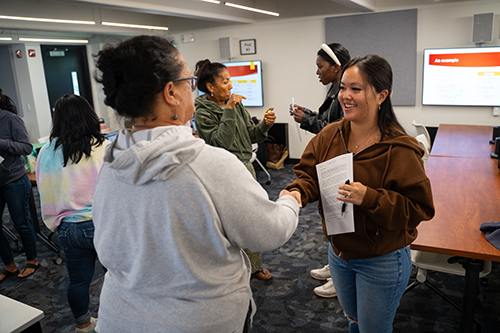Demystifying Financial Literacy

For a couple of hours on a Tuesday morning, Hale Hoaloha’s R301 became a trading floor, with buyers and sellers brokering deals during a stock market simulation game. Waving a card in the air—like a trader would do on a Stock Exchange—Waipahu High School Career and Technical Education (CTE) teacher Russell Park walked around the room, booming, “Who’s selling? I’m buying!” The exercise was all part of the Economics and Personal Finance Literacy Summer Institute, led by Dr. Guanlin Gao, Director of Chamiande’s Economic Education Center for Excellence and an Associate Professor of Economics with the School of Business and Communication.
“No takers,” said Park, after the first round. “What I’ve learned so far I wish I had known years ago. I have also realized the importance of sharing this information with kids—to prepare them for the real world.”
According to Gao, this summer institute offers students essential knowledge and skills on how to allocate limited resources they have in life, such as time and money, in the most efficient way to satisfy their wants and needs. It also prepares them to better understand and respond to the events that shape their economic environment and financial well-being.
“We’re all natural-born economists,” said Gao, while looking around the classroom. “You might not just realize it … for now.”
Initially intimidated by graphs and charts, DJ Woodard of Waianae High School, grew comfortable with the classes after the first day. On the trading floor, she used her savvy and some recently-learned buzz terms to clinch a deal and made a profit.

“This shows us how to give our students a financial foundation,” says Woodard, a transition coordinator. “It gives them exposure to financial literacy, such as budgeting and saving.”
According to Gao, this institute is taught in a combination of lectures (with an emphasis on real-life examples and situations), in-class games and group activities, hands-on projects and field classes. The curriculum includes the economics and personal finance concepts based on the Hawaii Department of Education (HDOE) Social Studies Common Core standards, including such topics as market operations and government interventions, environmental economics, personal finance education and financial wellness.
“I wish this was available when I was young,” Woodard lamented. “I would have had a better financial foundation. But I guess at 60 years old, it’s never too late.”
Through the training, participating teachers received access to teaching resources, including ready-to-adopt lesson plans—which Woodard said she plans to use—and one-on-one assistance in adopting and adapting lesson plans for specific grade levels.
A 10th grade health teacher at Farrington High School, Jan Halpenny was part of the first cohort from last year’s institute. So, too, was Kalelani Ogata, a special needs teacher at Abraham Lincoln Elementary School.
“Students are so ill-prepared financially,” said Halpenny, who attended this year’s luncheon finale. “They don’t even understand the most basic of finances, such as supply and demand.”

For her part, Ogata set up a class store, where the only accepted currency is good behavior. “These are special need 3- to 5-year-old kids,” she said. “They learn to count, and they quickly learn that needs and wants aren’t the same thing. The kids go home excited to talk about what they learned.”
The Nation’s Report Card on Financial Literary gave Hawaii a D grade, but cited some significant accomplishments, including the establishment and maintenance of a financial literacy website by the HDOE. Available is the HDOE Standards with Opportunities to Integrate Financial Literacy Concepts with financial literacy concepts matched to multiple English Language Arts, Mathematics, CTE, Social Studies and Science standards for K-12. The website also provides robust financial literacy resources and programs for teachers to help implement financial literacy instruction in their classrooms. In 2021, Hawaii’s legislature passed a resolution “urging the Department of Education to coordinate with the Department of Commerce and Consumer Affairs to implement a graduation requirement of at least a half credit in financial literacy during the junior or senior year.”
However, according to the report, although Hawaii has made efforts toward increasing its financial literacy instruction, mainly through establishing the Hawaii Public Schools Financial Literacy Task Force, it still receives a “D,” as it does not provide any substantial financial literacy instruction.
“We know we have work to do when it comes to financial literacy in Hawaii, but we are proud to be making a difference and serving as a hub for economics education,” Gao said. “Financial literacy doesn’t have to be hard and unreachable. In fact, financial literacy should be accessible to everyone.”



